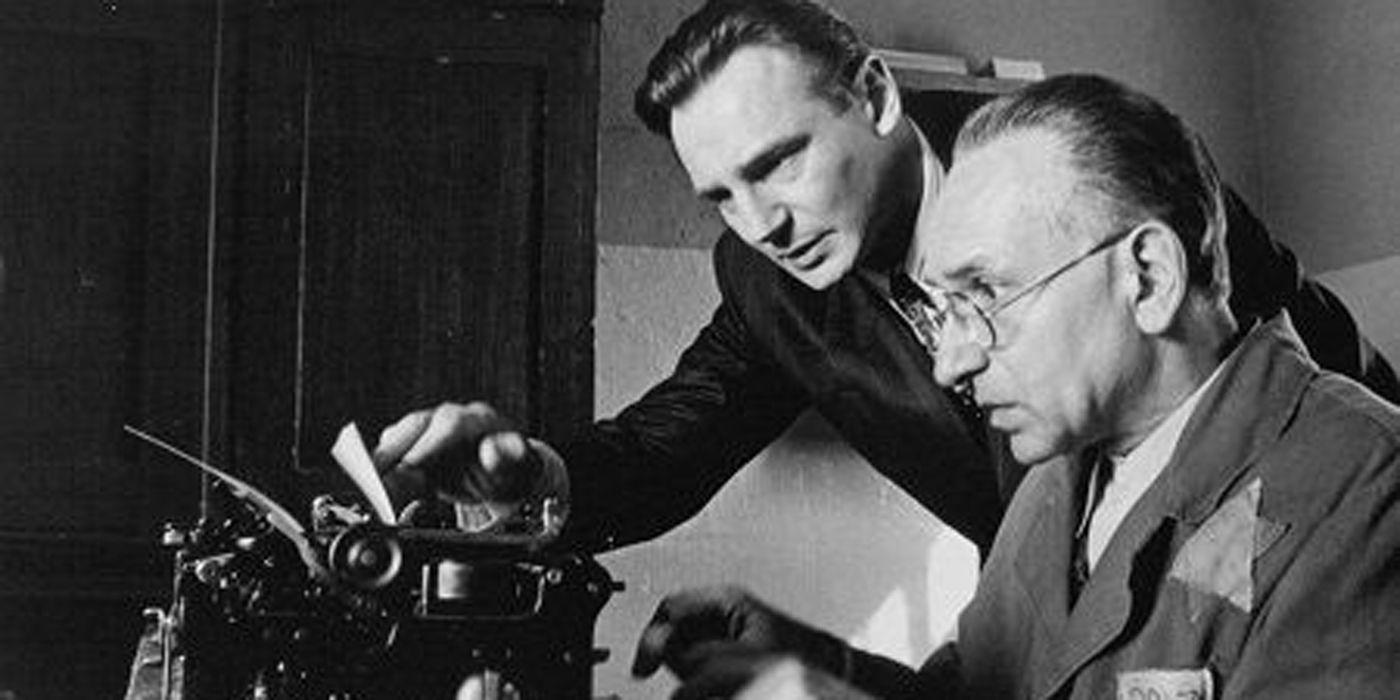There is an argument to be made that Steven Spielberg is the greatest American director of all time. Fifty-year careers don’t come around often in Hollywood, especially not for directors, and Schindler’s List is, without a doubt, his crowing achievement. The story of Oskar Schindler is as complicated as it is riveting and Steve Zaillian’s script, adapted from the book by Thomas Keneally, tells us the story in a way World War II films never had before.
Liam Neeson’s Schindler is an ambitious Nazi who thinks of himself more as a businessman. He bullies Itzhak Stern (Ben Kingsley) to enlist other Jews for a business proposition. They will give him what he needs and be paid in goods, not money. Having no choice, a few join and Stern realizes he can use this to his advantage. As the Nazis advanced, they began separating Jews based on “nonessential” and “essential” designations, which were subject to physical bias, and anyone deemed nonessential was shipped off. As Schindler’s company grows, so does his staff. Stern uses this to get nonessential Jews a job and out of harm’s way.
Schindler’s List Stands Apart From Other World War II Films
The most ingenious part about Schindler’s List is the story it chooses to tell. World War II is one of the most popular subgenres in the history of film. Approaching it from a business standpoint gives the film the energy of a heist or con — at least at first — and that is a great hook for a three-hour and fifteen-minute film about one of humanity’s greatest tragedies.
Zaillian’s script is careful not to make light but to make room for light. Even towards the back half of the film, when any sense of a caper is lost and it’s truly just a movie about the Holocaust, there is a funny moment with Ralph Fiennes’ Amon Goeth’s gun not firing. What makes the movie so visceral is that it shows the humanity as much as it shows the inhumanity. It’s not easy to get through because of its subject matter, but it’s no less powerful.
The actors’ performances are some of the best Spielberg has ever conjured, and the score is devastatingly glorious. But the real star of the show is the cinematography. Cinematographer Janusz Kaminski has worked with Speilberg on countless projects, but his work here is nothing short of perfect.
The attention to detail by Kaminski paired with Spielberg’s vision for the film make it a one-of-a-kind watch that stands the test of time.
For a movie made in the 90s, the film stock is so true to form you might think it was made in the 50s or 60s. When we see film used today to emulate decades past, it can certainly work, but Schnidler’s List looks like a film that would have been made about the same subject at the same time. The immersive nature extends to the lighting, which uses shadow to show the Jewish people’s plight and harsh light on the gods the Nazis perceive themselves to be.
While so many war movies are filled with action and focus a lot on it, Schindler’s List doesn’t. There is a shooting in it, and that shooting is explicitly tragic. The framing of these scenes conveys so much emotion that when you finally rest for a moment and watch the characters pray, it feels like a truly spiritual experience.

Related
Kiki’s Delivery Service Review: Returning To Ghibli’s 35-Year-Old Classic Feels Like Coming Home
After 35 years, there’s nothing more comforting or moving than returning to one of Studio Ghibli’s most enduring coming-of-age narratives.
Schnidler’s List does what so many World War II films struggle to do: be extraordinary. It’s also extraordinarily long, but that doesn’t deter the film at all. The attention to detail by Kaminski paired with Spielberg’s vision for the film make it a one-of-a-kind watch that stands the test of time. It’s almost unheard of for someone to make a movie about their oppressors and how they become better people than when the film started. It is a brave act that gives us a near-perfect masterpiece of filmmaking.
Schindler’s List is 195 minutes long and rated R for language, some sexuality and actuality violence.

Schindler’s List is a historical drama directed by Steven Spielberg, chronicling the efforts of Oskar Schindler, a German businessman who saved over a thousand Polish Jews during the Holocaust. Starring Liam Neeson, Ben Kingsley, and Ralph Fiennes, the film vividly portrays the atrocities committed during World War II while highlighting Schindler’s transformation from a profit-driven industrialist to a humanitarian savior.
- Schindler’s List is unique
- The film doesn’t shy away from the harsh reality but it’s also hopeful
- The film’s cinematography is excellent and holds up
- Easily Steven Spielberg’s best film


